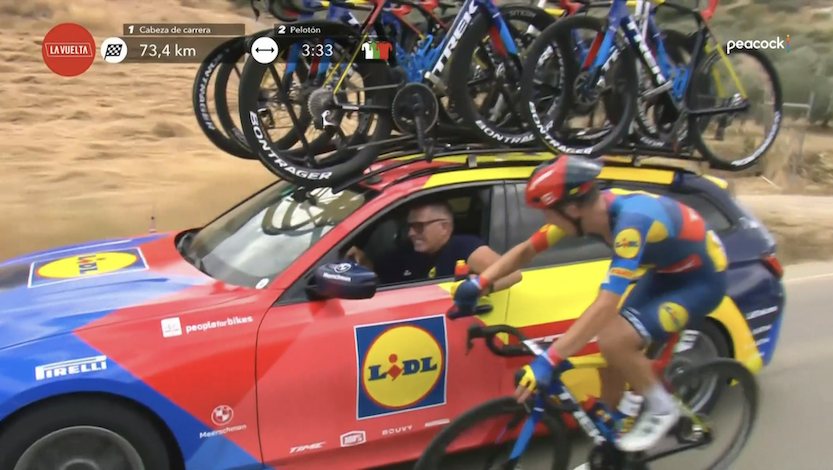
After significant blowback, Peloton has been airing a shorter version of its widely-mocked holiday ad in which the partner of the put-upon “Peloton woman” is nearly eliminated from the spot.
Critics have blasted “The Gift That Gives Back,” in which the male husband of “Grace from Boston,” surprises her with a Peloton bike (starting price: $2,245) on Christmas morning. The young wife and mother videotapes her workouts over a year, then splices the footage together into a “Thank You” video she shares with her husband the following Christmas.
“A year ago I didn’t realize how much this would change me. Thank you!” says Grace. He rewards her with a pleased smile.
The spot has been called a male chauvinist fantasy, with the husband as the hero. So the maker of Internet-connected stationary bikes and treadmills took a more abbreviated approach this past Sunday during ESPN’s telecast of the “Sunday NFL Countdown” pregame show.
In the 15-second version, the husband is seen in silhouette only at the beginning of the spot. Instead, it ends with the woman telling herself via selfie: “That was totally worth it.”
The previous creative payoff, with “Grace” beaming adoringly at her hero as they watch the video together, was left on the cutting room floor.
Meanwhile, Peloton also aired a different holiday spot on ESPN Monday morning showing a town full of dedicated Pelton users rising before dawn to work out with their virtual instructor. The tagline: “Our kind of joy feels different.”
Given the widespread derision for “The Gift That Gives Back” by “Saturday Night Live,” Ryan Reynolds’ Aviation Gin and an army of online critics, Peloton could be phasing it out in favor of “Our Kind of Joy.”
Peloton declined to comment, as did ad agency Mekanism, which did not return emails. But Peloton previously told CNBC it was “disappointed in how some have misinterpreted” its controversial commercial.
“We are encouraged by – and grateful for – the outpouring of support we received from those who understand what we were trying to communicate.”
Speaking at a conference hosted by the financial firm UBS, Peloton’s chief executive John Foley, declined to comment directly on the commercial, but told the crowd, “We have a fun challenge, and we’re going to solve it as marketers, because the reality is that it is an incredible value, and we’re changing lives, and we’re allowing people to get more fit and get more healthy and get those endorphins and be better versions of themselves and all this existential stuff that we’re excited about at the top of Maslow’s hierarchy of needs.” according to the New York Times.
For much of 2019, Peloton had been riding a wave of success.
As of June 30, Peloton had sold 577,000 interactive fitness products and boasted 1.4 million members, according to The Motley Fool. Over the past three years, it has quadrupled revenue, to $915 million in 2019 from $218 million in 2017. The company raised $1.2 billion in its initial public offering in September.
Celebrities from Ellen DeGeneres and Hilary Duff to Michael Phelps and Howard Stern have touted its products.
However, this ad has brought some of that crashing down.
“There are only two things that unify the country right now: The love for baby Yoda on ‘The Mandalorian,’ and contempt for the Peloton Christmas ad,” said marketing consultant Ernest Lupinacci.
If Peloton wants a clinic on how to create a fitness commercial it should study Nike, said Lupinacci, who’s created award-winning campaigns for Nike and ESPN.
The Peloton marketing team, unfortunately, “drank their own Kool-Aid” and believed they were “changing the world.”
What’s worse, said Lupinacci, is they’re forcing their own upscale customers to defend an indefensible piece of content.
More people searched on Google for “Peloton” than the “impeachment” of President Donald Trump last week, noted Lupinacci.
Emphasizing the woman’s wellness journey, rather than her puppy dog-like desire to please her master, is a start at least, said media critic Barbara Lippert.
“It does help. It just seems like it’s all reactive to his gift rather than something she chose to do,” she said. “She just seems so eager to please. The women who are actually doing this are in incredible shape. They can power-lift their husbands.”
Still, Lippert warned the ad is so “ridiculous and poorly executed” Peloton may not be able to dig out of this marketing hole.
The problem, she added, is the spot pushes two hot buttons: sexist treatment of women and class resentment toward rich people and their luxury fitness equipment.
Lippert compares it to a 1950’s commercial in which the husband gives his wife a vacuum cleaner – and she jumps for joy. Moreover, actress Monica Ruiz’s big, pleading eyes make her look like she’s in a “hostage video,” says Lippert.
“It just seems like she’s this prisoner in her house – dealing with this thing her husband makes her do.”
Peloton can still change gears marketing-wise and try to take back the narrative, according to advertising, media and marketing experts contacted by Front Office Sports.
The first and most obvious move would be to dump the tone-deaf spot. Yes, the company has bought the media time. But there’s no use throwing good money after bad, warns Crisis PR expert Mike “The Reputation Doctor” Paul.
The company should immediately pull “The Gift That Gives Back” in favor of another ad proven more effective. After breaking Nov. 4, the spot was still airing nationally as of Dec. 10, according to ad tracker iSpot.tv.
“Destroy the ad, don’t edit it down,” said Paul. “The brand is now associated with being a male chauvinist pig.”
There’s also an opening to highlight Peloton’s real-life success stories.
The real-head-scratcher, said Lupinacci, is why Peloton cast SAG actors/actresses in fictional roles when it has thousands of satisfied customers and high-powered spinning instructors who’d love to appear in a commercial.
READ MORE: ‘Let’s Bring Women In:’ Chargers Lean Into Podcast For Female Fans
Going back to the days of Charles Atlas’ “98-pound weakling” ads in comic books, fitness campaigns have traditionally taken a before/after approach, he noted.
Why not roll out an ad campaign showing real-life Peloton customers who’ve gotten into great shape over a year, asked Lupinacci, rather than a rail-thin actress who online wags joke went from 115 to 112 pounds.
Peloton could also find plenty of stories among the real-life spinning instructors who inspire people every day.
“The only thing worse than a terrible commercial for a terrible product is a terrible commercial for a good product,” warned Lupinacci. “I mean, what is the message of this commercial? If you’re a damaged individual leading a life of quiet desperation in the suburbs, have we got a piece of overpriced equipment for you? It doesn’t make sense.”
From a public relations perspective, Peloton still doesn’t get it, warned Crisis PR expert Paul. Insincere apologies by corporations usually don’t work. Peloton’s attempt last week fell flat.
“A proper apology goes a long way. They blew the ad, they blew the apology and they blew the re-edit,” Paul said.
Lippert agreed. Telling customers you regret that they’re too dumb to understand your brilliant holiday commercial is not the best approach media-wise.
“Their apology was as tone-deaf as the commercial,” she said.
Ultimately, Madison Avenue has to do a better job at diversity, according to Paul.
READ MORE: FS1 To Cancel ‘Fair Game With Kristine Leahy’
All three experts guessed the same thing. That this Peloton ad supposedly aimed at women was probably written and approved by men. If more women had been involved in the creative process, Peloton might not have shot itself in the foot.
“Somebody had to speak up and say, ‘You guys are out of your mind, you better test this because it’s not going to work,’” said Paul. “This is not the 1950’s. This is not ‘Mad Men.’ This was a poor strategy.”

















